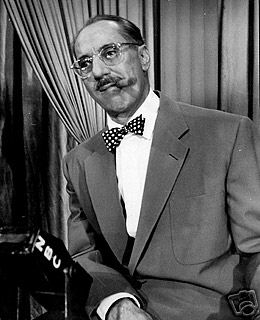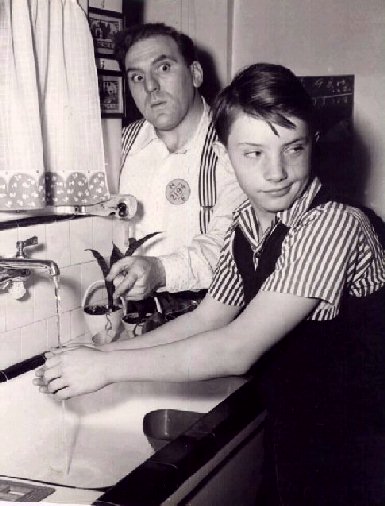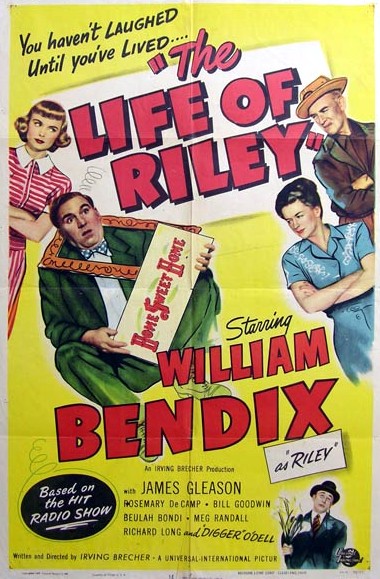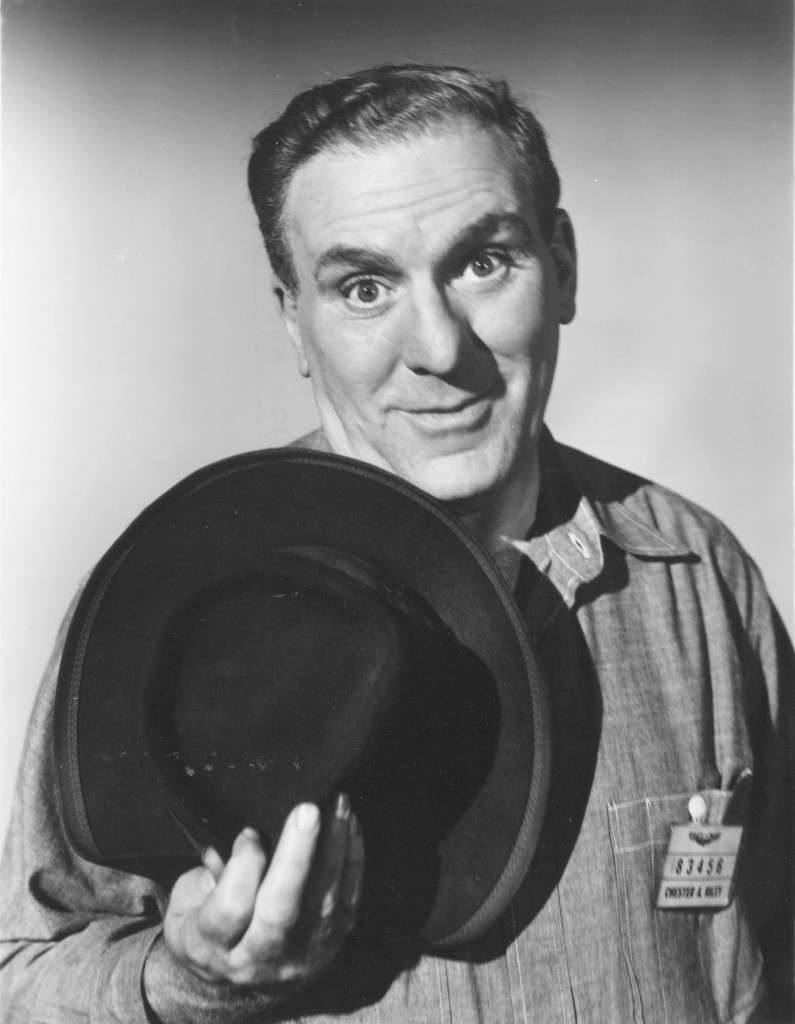What a revoltin’ anniversary this is!
This past Monday, January 14th, marked the 107th birthday of actor William Bendix…who graced the silver screen during the 1940s/1950s in such movie classics as Wake Island (1942), Lifeboat (1944) and Detective Story (1951). Tomorrow, January 17th, is the 99th birthday of writer-director-producer Irving Brecher. Brecher wrote such screenplays as Shadow of the Thin Man (1941) and Meet Me in St. Louis (1944), and later in his career directed films like Somebody Loves Me (1952) and Sail a Crooked Ship (1961).
It’s only fitting, then, that the collaboration between these two men chalks up its 69th anniversary today—a situation comedy that debuted on radio, but saw its popularity launch both a successful film and two different versions on television. You know it as The Life of Riley.
 Irving Brecher was very good friends with comedian Groucho Marx—in fact, Brecher is the only screenwriter to receive sole credits on two of the films starring Groucho and his brothers: At the Circus (1939) and Go West (1940). Groucho approached Irving one day and asked if the writer might have a radio property available that he could tailor to the acerbic comedian’s talents. Brecher dusted off a pilot he had written entitled The Flotsam Family. Groucho would play a husband and father whose work habits dictated that he would have to find a new job every week. An audition record for the show was created, but although the audience liked the “pilot” (because “they liked Groucho,” Brecher later reminisced), the prospective sponsor wisely took a pass on the show on the basis that he just didn’t think Groucho was believable as a family patriarch.
Irving Brecher was very good friends with comedian Groucho Marx—in fact, Brecher is the only screenwriter to receive sole credits on two of the films starring Groucho and his brothers: At the Circus (1939) and Go West (1940). Groucho approached Irving one day and asked if the writer might have a radio property available that he could tailor to the acerbic comedian’s talents. Brecher dusted off a pilot he had written entitled The Flotsam Family. Groucho would play a husband and father whose work habits dictated that he would have to find a new job every week. An audition record for the show was created, but although the audience liked the “pilot” (because “they liked Groucho,” Brecher later reminisced), the prospective sponsor wisely took a pass on the show on the basis that he just didn’t think Groucho was believable as a family patriarch.
 Groucho would have to wait until 1947 before finding solo radio success with You Bet Your Life. In the meantime, Brecher made a fateful trip to the movies one evening. On the bill was a Hal Roach “streamliner” (the producer’s nickname for films that ran between 40-50 minutes) entitled The McGuerins of Brooklyn (1942). Irving thought the star of that film, William Bendix, would be ideal for the role of his “Flotsam,” and in contacting Bendix’s agent learned that the actor was interested in doing a radio series. A few changes to the script were made by Brecher, another audition record was recorded, and then…nothing. It wasn’t until six months later that a representative from the American Meat Institute contacted Brecher and expressed an interest in putting what was now called The Life of Riley on the air. The program then debuted over the Blue network (later known as ABC) on January 16, 1944.
Groucho would have to wait until 1947 before finding solo radio success with You Bet Your Life. In the meantime, Brecher made a fateful trip to the movies one evening. On the bill was a Hal Roach “streamliner” (the producer’s nickname for films that ran between 40-50 minutes) entitled The McGuerins of Brooklyn (1942). Irving thought the star of that film, William Bendix, would be ideal for the role of his “Flotsam,” and in contacting Bendix’s agent learned that the actor was interested in doing a radio series. A few changes to the script were made by Brecher, another audition record was recorded, and then…nothing. It wasn’t until six months later that a representative from the American Meat Institute contacted Brecher and expressed an interest in putting what was now called The Life of Riley on the air. The program then debuted over the Blue network (later known as ABC) on January 16, 1944.
 Bendix played the title role—a Brooklyn expatriate named Chester A. Riley who had migrated west to Los Angeles with his wife Peg, daughter Barbara (affectionately known as “Babs”) and son Chester, Jr (“Junior” to family and friends). Riley was a beefy, good-hearted slob who was employed at an aircraft plant as a welder. More often than not, the plots concentrated on his home life, where he had a rare talent for taking the simplest of situations and transforming them into unmitigated disaster. Impossible to dissuade once he had determined a certain course (“My head is made up!”), Riley would invariably be rescued by the down-to-earth, level-headed Peg—played through the entire run of the series (1944-51) by actress Paula Winslowe. Once things had morphed into complete catastrophe, Riley would throw up his hands and utter those plaintive words that became a national catchphrase: “What a revoltin’ development this is!”
Bendix played the title role—a Brooklyn expatriate named Chester A. Riley who had migrated west to Los Angeles with his wife Peg, daughter Barbara (affectionately known as “Babs”) and son Chester, Jr (“Junior” to family and friends). Riley was a beefy, good-hearted slob who was employed at an aircraft plant as a welder. More often than not, the plots concentrated on his home life, where he had a rare talent for taking the simplest of situations and transforming them into unmitigated disaster. Impossible to dissuade once he had determined a certain course (“My head is made up!”), Riley would invariably be rescued by the down-to-earth, level-headed Peg—played through the entire run of the series (1944-51) by actress Paula Winslowe. Once things had morphed into complete catastrophe, Riley would throw up his hands and utter those plaintive words that became a national catchphrase: “What a revoltin’ development this is!”
 Riley’s children, Babs and Junior, were played by a number of young actors and actresses through the program’s run. Sharon Douglas, Barbara Eiler and Louise Erickson were heard as Babs. Conrad Binyon, Scotty Beckett, Jack Grimes, Tommy Cook, Bobby Ellis and Alan Reed, Jr. all took turns as the younger Riley. Most of the memorable characters on the program were played by radio veterans, however. Hans Conried made appearances in the early shows as Uncle Baxter, a sponging relative who lived with the Rileys, and Francis “Dink” Trout was Waldo Binney, a nebbishly creampuff who was one of Riley’s neighbors. Other performers heard from time to time include Alan Reed (as Riley’s boss at the plant), Charlie Cantor, Elvia Allman, Ken Christy, Sid Tomack, Jim Backus, Mary Jane Croft, Herb Vigran and Shirley Mitchell.
Riley’s children, Babs and Junior, were played by a number of young actors and actresses through the program’s run. Sharon Douglas, Barbara Eiler and Louise Erickson were heard as Babs. Conrad Binyon, Scotty Beckett, Jack Grimes, Tommy Cook, Bobby Ellis and Alan Reed, Jr. all took turns as the younger Riley. Most of the memorable characters on the program were played by radio veterans, however. Hans Conried made appearances in the early shows as Uncle Baxter, a sponging relative who lived with the Rileys, and Francis “Dink” Trout was Waldo Binney, a nebbishly creampuff who was one of Riley’s neighbors. Other performers heard from time to time include Alan Reed (as Riley’s boss at the plant), Charlie Cantor, Elvia Allman, Ken Christy, Sid Tomack, Jim Backus, Mary Jane Croft, Herb Vigran and Shirley Mitchell.
 But the best-remembered of them all was actor John Brown, who did double duty on the program. First, he was Jim Gillis, Riley’s best friend and neighbor whose “advice” to his pal more often than not landed him in deeper trouble than he was already in. Brown’s breakout character, however, was born one day when writer Irving Brecher, stuck with a small hole to fill in the week’s show, created an undertaker character named Digby “Digger” O’Dell for a one-shot appearance…and was surprised when he became popular with the radio audience. Though the company sponsoring the show asked him to get rid of “Digger,” Brecher decided to beef up his presence on the show with each passing week—and later credited his creation with saving the series. O’Dell would encounter Riley in various venues on each broadcast and greet him somberly: “You’re looking fine, Riley—very natural!” The dialogue exchange between Riley and “Digger” always consisted of hilarious macabre puns on the undertaker’s part…and when they had conducted their business, O’Dell would always tell his chum: “Cheerio—I’d better be shoveling off.”
But the best-remembered of them all was actor John Brown, who did double duty on the program. First, he was Jim Gillis, Riley’s best friend and neighbor whose “advice” to his pal more often than not landed him in deeper trouble than he was already in. Brown’s breakout character, however, was born one day when writer Irving Brecher, stuck with a small hole to fill in the week’s show, created an undertaker character named Digby “Digger” O’Dell for a one-shot appearance…and was surprised when he became popular with the radio audience. Though the company sponsoring the show asked him to get rid of “Digger,” Brecher decided to beef up his presence on the show with each passing week—and later credited his creation with saving the series. O’Dell would encounter Riley in various venues on each broadcast and greet him somberly: “You’re looking fine, Riley—very natural!” The dialogue exchange between Riley and “Digger” always consisted of hilarious macabre puns on the undertaker’s part…and when they had conducted their business, O’Dell would always tell his chum: “Cheerio—I’d better be shoveling off.”
 With the success of the radio series, Brecher brought a version of The Life of Riley (which he wrote and directed) to the silver screen in 1949…and its popularity led to a television adaptation that had to function without its main star, William Bendix, because the actor couldn’t contractually appear on TV. So, Brecher went with an unknown Jackie Gleason as his welder and family man—and though the show would win an Emmy Award as Best Comedy Series, Riley’s sponsor dropped the program shortly afterward. When Bendix was finally able to make the leap to the cathode ray tube, a second version of The Life of Riley premiered over NBC-TV in the winter of 1953, and the Bendix incarnation was a solid hit for five seasons.
With the success of the radio series, Brecher brought a version of The Life of Riley (which he wrote and directed) to the silver screen in 1949…and its popularity led to a television adaptation that had to function without its main star, William Bendix, because the actor couldn’t contractually appear on TV. So, Brecher went with an unknown Jackie Gleason as his welder and family man—and though the show would win an Emmy Award as Best Comedy Series, Riley’s sponsor dropped the program shortly afterward. When Bendix was finally able to make the leap to the cathode ray tube, a second version of The Life of Riley premiered over NBC-TV in the winter of 1953, and the Bendix incarnation was a solid hit for five seasons.
 The Life of Riley remains one of the most popular radio sitcoms still in demand with OTR listeners today—partly because of the good-natured charm of William Bendix, the lovable lug you just can’t help wanting to protect…especially from himself. And, the sharp black humor of “Digger” O’Dell is a draw for many fans as well. If you haven’t made your acquaintance with this comedy classic from the Golden Age of Radio, we suggest that the collections What a Revoltin’ Development and My Head is Made Up! are as good as any place to start.
The Life of Riley remains one of the most popular radio sitcoms still in demand with OTR listeners today—partly because of the good-natured charm of William Bendix, the lovable lug you just can’t help wanting to protect…especially from himself. And, the sharp black humor of “Digger” O’Dell is a draw for many fans as well. If you haven’t made your acquaintance with this comedy classic from the Golden Age of Radio, we suggest that the collections What a Revoltin’ Development and My Head is Made Up! are as good as any place to start.



It’s worth knowing that while John Brown brought the character of Digger O’Dell over to the Jackie Gleason version of the TV show, neither he nor the character were to be found when the show returned to TV with William Bendix. Brown had been blacklisted because his name appeared in “Red Channels.” He died of a heart attack in 1957 at age 53.
So, the blacklisting killed him, eh? I can barely remember the 50’s, just as a kid delivering newspapers and being told to watch out for scabs and violence from the competing daily. Christ, the paranoia infected my entire youth–I was to aware, too quick to shuffle-off, too noir.
What A Revoltin’ Article — I mean Development. I love that guy! Those collections both belong in MY collection — and I hope to have them soon. Thanks for a well-deserved tribute to William Bendix.
I love The Life of Riley! It’s definitely one of my favorite programs. Thanks for the article.
[…] then fortunate in that he could avail himself of the services of the actor who made the show such a huge radio hit: William Bendix. However, Bendix was contractually forbidden to perform on that newfangled tee […]